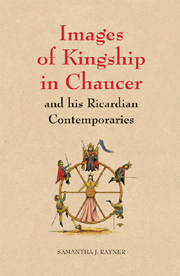4 - Chaucer
Published online by Cambridge University Press: 12 September 2012
Summary
This final chapter is concerned with the work of the best-known of all the Ricardian poets, Geoffrey Chaucer: ‘the most receptive as well as the most inventive English poet of the Middle Ages’. Chaucer's work has been consistently celebrated for its breadth of scope and range of styles; writing while in the service of different members of the royal family through the reigns of three different monarchs, he was in an excellent position to comment on the political and social events of his time. He travelled widely, carrying out royal business on the continent, and knew the courts of France and Italy well. Yet, as we shall see, he rarely comments on those kings whose lives he had the opportunity to observe from close quarters, or engages directly with ideas of kingship. Indeed, to ‘turn to Chaucer and ask that he sum up a conversation about the definition of regal authority is to ask the master of indirection for an answer he can only give obliquely’. He is ‘involved, yet objective, detached yet sympathetically moved’ by events around him, and this constant shifting of attitudes makes it difficult to assess with any final accuracy his relationship with the idea of kingship. It is only in a few of the shorter poems, written at the end of his life, that we see more or less overt attempts to engage with a royal audience.
- Type
- Chapter
- Information
- Publisher: Boydell & BrewerPrint publication year: 2008



